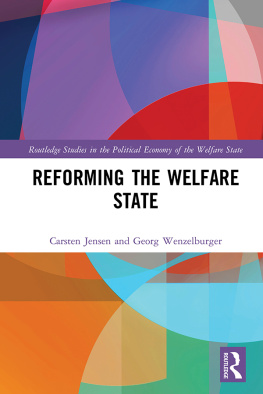Reforming the Welfare State
This book introduces a unique, new dataset on welfare state reforms in the UK, Denmark, Finland, France and Germany from 1974 to 2014.
Using a variety of welfare state types in Europe, the authors have systematically investigated core questions that have preoccupied the welfare state literature at least since the 1990s. These include the extent of path dependency in mature welfare states, the usage of so-called invisible policy instruments for hiding cutbacks, and the role of partisanship on whether the ideological color of the incumbent affects policy which have been analysed in depth by examining the new dataset presented in this book.
This text will be of key interest to scholars, students and practitioners studying, and working in, welfare and the welfare state, and more broadly to political science, sociology and social policy.
Carsten Jensen is Professor at the Department of Political Science, Aarhus University, Denmark.
Georg Wenzelburger is Professor at the Department of Social Sciences, TU Kaiserslautern, Germany.
Routledge Studies in the Political Economy of the Welfare State
This series presents leading edge research on the recasting of European welfare states. The series is interdisciplinary, featuring contributions from experts in economics, political science and social policy. The books provide a comparative analysis of topical issues, including:
- reforms of the major social programmes - pensions, health, social security
- the changing political cleavages in welfare politics
- policy convergence and social policy innovation
- the impact of globalisation
Series editors: Martin Rhodes, University of Denver, USA, and Maurizio Ferrera, The European University Institute, Florence, Italy
Politics of Segmentation
Party Competition and Social Protection in Europe
Georg Picot
Pension Reforms in Central, Eastern and Southeastern Europe
From Post-Socialist Transition to the Global Financial Crisis
Igor Guardiancich
The Politics of Welfare State Transformation in Germany
Still a Semi-Sovereign State?
Christof Schiller
The Politics of Work-Family Policy Reforms in Germany and Italy
Agnes Blome
Fighting Poverty and Social Exclusion in the EU
A Chance in Europe 2020
Edited by Matteo Jessoula and Ilaria Madama
Business Interests and the Development of the Modern Welfare State
Edited by Dennie Oude Nijhuis
Reforming the Welfare State
Carsten Jensen and Georg Wenzelburger
For more information about this series, please visit: https://www.routledge.com/ Routledge-Studies-in-the-Political-Economy-of-the-Welfare-State/book-series/PEW
First published 2020
by Routledge
2 Park Square, Milton Park, Abingdon, Oxon OX14 4RN
and by Routledge
52 Vanderbilt Avenue, New York, NY 10017
Routledge is an imprint of the Taylor & Francis Group, an informa business
2020 Carsten Jensen and Georg Wenzelburger
The right of Carsten Jensen and Georg Wenzelburger to be identified as authors of this work has been asserted by them in accordance with sections 77 and 78 of the Copyright, Designs and Patents Act 1988.
All rights reserved. No part of this book may be reprinted or reproduced or utilised in any form or by any electronic, mechanical, or other means, now known or hereafter invented, including photocopying and recording, or in any information storage or retrieval system, without permission in writing from the publishers.
Trademark notice: Product or corporate names may be trademarks or registered trademarks, and are used only for identification and explanation without intent to infringe.
British Library Cataloguing-in-Publication Data
A catalogue record for this book is available from the British Library
Library of Congress Cataloging-in-Publication Data
Names: Jensen, Carsten, 1980- author. | Wenzelburger, Georg, author.
Title: Reforming the welfare state / Carsten Jensen and Georg Wenzelburger.
Description: Abingdon, Oxon ; New York, NY : Routledge, 2020. |
Series: Routledge studies in the political economy of the welfare state |
Includes bibliographical references and index.
Identifiers: LCCN 2019034226 (print) | LCCN 2019034227 (ebook) |
ISBN 9781138482227 (hardback) | ISBN 9781351058599 (ebook)
Subjects: LCSH: Welfare state--Europe. | Europe--Social policy. |
Public welfare--Europe.
Classification: LCC HN373.5 .J46 2020 (print) | LCC HN373.5 (ebook) |
DDC 361.6/1094--dc23
LC record available at https://lccn.loc.gov/2019034226
LC ebook record available at https://lccn.loc.gov/2019034227
ISBN: 978-1-138-48222-7 (hbk)
ISBN: 978-1-351-05859-9 (ebk)
This book explores how governments in the past four decades have reformed the welfare state. We study this using the Welfare State Reform Dataset that includes all reforms of old age pensions and unemployment protection in Denmark, Finland, France, Germany and the UK from 1974 to 2014. Collecting and analyzing this data has required a lot of work from ourselves and the many individuals who have helped us along the way. First and foremost, we want to mention Christoph Arndt and Seonghui Lee who were part of a larger project that this book emerges from. and 7 draw on articles that Christoph and Seonghui are co-authors of, and which benefitted greatly from their involvement. We also want to thank the student assistants who at various points helped to collect and code the data: Malin Grninger, Kathrin Hartmann, Mathias Kamper, Anja Konanec, Lasse Leipziger, Sami Mustikkamaa, Fabienne Mller, Kristian Nicolaisen and Stefanie Thurm. The project has been generously supported by the Independent Research Fund Denmark (grant no. 400300013).
1.1 Background and motivation
The welfare state was one of the biggest social and political achievements of the 20th century, and two decades into the 21st it remains a defining characteristic of Western societies. Yet the so-called Golden Age of the welfare state in the 1950s, 1960s and early 1970s is long gone. Since the 1980s, a series of deep socio-economic transformations from the rise of the service economy, over an augmenting age burden, to mountains of public debt have ignited widespread and often intense debates about the proper role of the welfare state.
Much ink has been spilled on the effects of the past decades political reorientation, not least in terms of increased inequalities and the emergence of new, precarious groups in Western societies. Understanding the structure of the associated new social risks has become a major focal point in the academic literature (e.g. Esping-Andersen 1999; Esping-Andersen 2009; Standing 2011; Stiglitz 2012; Atkinson 2015; Putnam 2016). Similarly, many studies have analyzed the socio-economic preconditions of these changing outcomes, such as the emergence of new political coalitions between occupational groups (e.g. Beramendi et al. 2015; Iversen and Soskice 2015; Manow et al. 2018).
What has received considerably less attention is the nature of the policy reforms that transmit the new political landscape into new socio-economic outcomes, i.e. what policy instruments are governments employing to achieve their goals? This is an important omission because policy instruments the concrete legislative measures which make up welfare state reforms are rarely impartial. The choice of one policy instrument over another, for example the decision to adjust indexation rules instead of cutting benefit levels, not only reflects a governments wish to obtain some desired end-result, such as lower taxes or higher social mobility, but also serves a number of intermediate and sometimes much more salient political needs. A governments primary political need, of course, is its own reelection, but may also include auxiliary ones, such as strengthening or weakening specific social institutions such as labor unions. Although we may see such motives as irrelevant or perhaps even normatively undesirable, they are part and parcel of political life and one important reason why the needs and preferences of citizens are seldom mapped directly onto policy. Government politics, in short, is not a neutral transmission belt between citizens, on the one side, and social outcomes, on the other side.












